I’ve said before that I am with coconut oil like the dad in “My Big Fat Greek Wedding” is with Windex!
Coconut oil has a wide array of health benefits, hair and skin uses, and purposes around the home. I started using it a decade ago before it became popular and widely available in grocery stores.
Why? I’ll tell you!
The Coconut Oil Controversy
If you’ve been around the real food community much, you’ve probably noticed the rapid widespread popularity of coconut oil. Once ostracized by the medical community for its saturated fat content, it seems that coconut oil might finally be making a comeback in the mainstream health community.
Coconut oil is the most nutrient-dense part of the coconut. It is solid at room temperature like butter and doesn’t break down in heat or light.
For years, “health” advice has warned against consuming saturated fats, and coconut oil was thrown out with the rest without good reason!
These are some of the reasons why I love it:
The Many Benefits of Coconut Oil
This tropical oil is beneficial in many ways:
 For hair: This nourishing oil has been used for centuries in hair and its unique fat composition makes it especially beneficial for certain hair types. Use it as a hair mask, hot oil treatment, or in homemade hair products.
For hair: This nourishing oil has been used for centuries in hair and its unique fat composition makes it especially beneficial for certain hair types. Use it as a hair mask, hot oil treatment, or in homemade hair products.- To moisturize and nourish skin: The same properties make coconut oil great for skin as well. Many people like to use it as a natural moisturizer. Its natural antioxidant properties make it great for stopping wrinkles and skin irritation.
- Digestive help: Coconut oil’s concentration of beneficial fats in coconut oil makes it helpful for digestion. Its antimicrobial properties can help fight irritation and infection in the gut from candida.
- Great source of healthy fats: Over 50% of the fat in coconut oil is lauric acid. In fact, coconut oil is the richest source of lauric acid after breastmilk.
- Mental boost: Studies show MCTs may contribute to focus and mental performance.
- Hormone support: Getting the wrong kinds of fats can create havoc on hormones. Coconut oil contains specific fats that support the body’s natural hormone production.
- Immune support: The MCTs (including lauric acid, capric acid, and caprylic acid) have antifungal, antibacterial, and antiviral properties that make it beneficial for immune support.
- Great fat for cooking: Coconut oil is a stable oil that doesn’t break down easily at high temperatures like other oils do. It doesn’t go rancid easily and has amazing nutritional properties. It is great for cooking eggs, stir fry, grain-free baked goods, and practically any other cooking use.
Coconut oil is a superfood with a powerhouse of uses in cooking, beauty recipes, natural remedies and around the home.
Such as:
Ways to Use Coconut Oil
This versatile oil has hundreds of uses in the home, in beauty recipes, and in cooking. My favorite uses are:
Uses for Coconut Oil in Cooking and Recipes
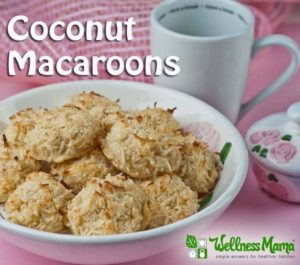 A great cooking oil with a high smoke point. Great for baking, stir-fry, or as a dairy free replacement to butter.
A great cooking oil with a high smoke point. Great for baking, stir-fry, or as a dairy free replacement to butter.- Try adding to foods or smoothies daily for energy
- Or emulsify into coffee for a homemade coffee creamer (The only way I’ll drink coffee!)
- In homemade mayo (without the high PUFA vegetable oils)
- To season cast iron skillets
- To boost metabolism (thanks to its high lauric acid and MCFA content)
- In a healthy brain-boosting snack for kids like these coconut clusters
- Add to a filling and energy-boosting brain power smoothie
- Mix a tablespoon with a tablespoon of chia seeds for an all-day energy boost (do NOT take this at night!)
- Use as a replacement for vegetable oils in any recipe or in cooking
- Or try your hand at making coconut-based grain-free granola recipes
- My kids love these homemade meltaways (like candy)
- Use it as an anti-aging facial moisturizer
- Make coconut cream concentrate for a brain-boosting snack
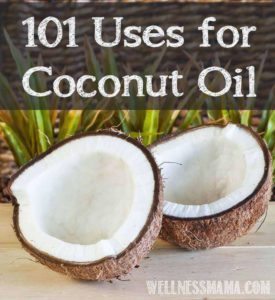
Coconut Oil Health Benefits and Uses
- It has been shown to increase the absorption of calcium and magnesium
- Internally as part of the protocol to help remineralize teeth
- Is an immediate source of energy when eaten that isn’t stored as fat
- To help speed weight loss when consumed daily
- It can help improve sleep when taken daily
- To support healthy thyroid function
- As a way to improve insulin levels when consumed regularly
- For faster skin healing after injury or infection because of its beneficial fats
- When used consistently on skin it can help get rid of cellulite
- Some evidence shows that the beneficial fats in coconut oil can help with depression and anxiety
- When taken regularly, it can boost hormone production
- Can relieve the pain of hemorrhoids when used topically
- Some studies show it can boost circulation and help those who often feel cold
- Internally during pregnancy to help provide baby necessary fats for development (especially when taken with omega-3s)
- There are entire books dedicated to the potential of saturated fats like coconut oil to help avoid Alzheimer’s
Coconut Oil Beauty Uses
The same properties that make it beneficial in cooking and recipes make coconut oil beneficial for hair and skin:
- On the skin as a basic lotion
- With other oils as part of an oil cleansing regimen for beautiful skin
- Whipped with shea butter for a soothing body balm
- In homemade lotion bars with other beneficial ingredients like shea butter
- In homemade deodorant– its natural antibacterial properties make it helpful in fighting odor
- Coconut oil makes an excellent eye-makeup remover on its own
- It may help lighten age spots when rubbed directly on the skin
- To help increase sun tolerance and avoid burning when used internally
- As a naturally low SPF sunscreen on its own when used topically
- In basic homemade lotion recipes
- Add a couple of drops of a favorite essential oil to make a delicious massage oil
- Mixed with equal parts sugar for a smoothing body scrub (use in the shower)
- Rubbed on lips as a natural lip balm or used in lip balm recipes
- In homemade slow cooker soap
- To make natural homemade sunscreen recipes with other protective ingredients
- As a natural personal lubricant that won’t disturb vaginal flora
- As a natural shave cream and after shave lotion
- Use it alone as a great tanning oil
- Mix with sea salt to remove dry skin on feet
- In natural homemade diaper cream
- Use it alone or with baking soda as a natural deodorant
- By itself or with baking soda as a naturally whitening toothpaste
- Make homemade peppermint lip balm
- Or make magnesium body butter
- Rub on cuticles to help nails grow
- Rub into elbows daily to help alleviate dry, flaky elbows
- To help avoid chlorine exposure when swimming
- As a completely natural baby lotion
Coconut Oil for Hair
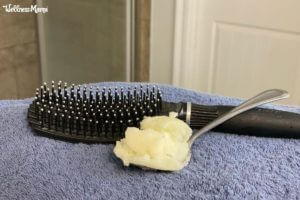 Rub into scalp daily to stimulate hair growth
Rub into scalp daily to stimulate hair growth- Or use in homemade shampoo bars
- A tiny dab rubbed on your hands and then through hair makes a great anti-frizz treatment
- As an incredibly intensive natural conditioner: Rub into dry hair, put a shower cap on and leave for several hours before washing out with several rounds of shampoo.
Coconut Oil Uses Around the Home
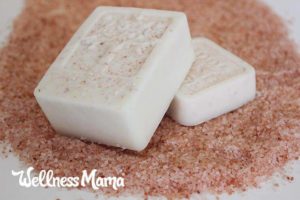 In homemade soap for laundry
In homemade soap for laundry- In homemade natural bug repellant lotion bars
- To make a simple homemade soap
- Or make a clay and charcoal soothing soap
- To soften and condition real leather (shiny leather only… test a small area first)
- And use a small amount to dilute essential oils for use on skin
- For pets struggling with skin issues when used externally
- In coconut oil dog treats
- On hands after doing dishes to avoid dry skin
- Mixed with catnip, rosemary, or mint essential oils as a natural bug repellent
Natural Remedies With Coconut Oil
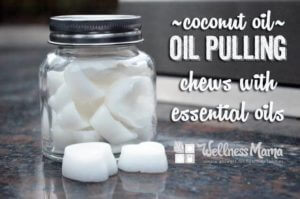 In coconut oil pulling chews and oil pulling for oral health
In coconut oil pulling chews and oil pulling for oral health- Rubbed on the inside of your nose or ingesting to help alleviate allergy symptoms
- Applied topically to kill yeast or yeast infections
- As an ingredient in remineralizing toothpaste (the antimicrobial properties and beneficial fats do wonders!)
- Can help soothe psoriasis or eczema
- Oil pulling with coconut oil and a drop of oregano oil to improve gum health
- Can help improve cholesterol ratios
- Can help reduce appearance of varicose veins when used topically
- To speed the healing of sunburn
- Blended into hot tea to help speed recovery from cold, flu, or sore throat
- As an anti-inflammatory remedy to lessen arthritis symptoms
- To reduce the itch of mosquito bites
- Can help resolve acne when used regularly
- In homemade vapor rub
- Internally and externally to speed recovery from UTIs
- In a salve for cracked heels
- Reader tip: try it coconut oil for a yeast infection! She suggests soaking a tampon in it and inserting the tampon for a few hours.
- Naturally clears up cold sores
- Some people say ingesting coconut oil daily can increase mental alertness
Coconut Oil for Pregnancies, Babies, and Children
- As a cloth diaper safe diaper cream (just rub on baby’s bottom)
- I’ve used in kids’ ears to help speed ear infection healing
- In place of Lanolin cream on nursing nipples to soothe irritation (also great for baby!)
- Nursing moms can take a couple of tablespoons a day (and vitamin D) to increase milk supply and nutrients
- To help soothe the itch of chicken pox or poison ivy
- Use on skin to avoid stretch marks during pregnancy
- Used directly on the perineum to help heal after birth
- To get rid of cradle cap on baby — just massage in to head, leave on for a few minutes, and gently rinse with a warm washcloth
- With apple cider vinegar as a natural treatment for lice that actually works
You can also check out my recipe list for many more recipes that use coconut oil!
Types of Coconut Oil: Refined vs. Unrefined
There are several choices when it comes to using this healthful fat.
You’ll find:
Unrefined Organic Coconut Oil
Considered the gold standard. This type of oil offers most of the benefits listed above. It is extracted from fresh coconut using a wet-milled fermentation process that protects the beneficial properties of the coconut. This type of coconut oil has been found to have the highest antioxidant levels. This process does use heat but studies show that it does not harm the oil or reduce nutrient levels. In fact, the heat may be beneficial and create a higher quality oil.
“Extra Virgin” Coconut Oil
The gold standard for olive oil but not coconut oil. This is produced by cold-pressing the oil and does not preserve the antioxidants as well:
In 2013, a study that compared “cold extracted virgin coconut oil” (CEVCO) with “hot extracted virgin coconut oil” (HEVCO) and standard refined coconut oil (CCO) was conducted in India, and published in the journal Food Science and Biotechnology. This study, like many others, showed that virgin coconut oils actually lower LDL cholesterol, while raising the “good” HDL cholesterol.
This study also confirmed that virgin coconut oil produced with heat produced the highest amounts of antioxidants: “The antioxidant activity in the HEVCO group was 80-87%, 65-70% in CEVCO, and 35-45% in CCO.” The researchers went on to comment why heat is necessary to produce the highest amounts of antioxidants in virgin coconut oil. (source)
Refined Coconut Oils
Refined coconut oil is often tasteless and has no coconut smell. It is usually heated, bleached, and deodorized. Healthy options are available but many refined coconut oils do not have the benefits of unrefined.
Fractionated Oil or MCT Oil
Fractionated oil or MCT oil is a liquid oil that does not get solid below 76 degrees like unrefined oil does. It doesn’t contain all of the beneficial properties of unrefined coconut oil but is higher in brain-boosting fats.
What Type to Use?

For external uses, expeller-pressed, fractionated or other types of refined coconut oil will work, but for internal use, an unrefined organic oil is best.
Want to try it out? I love this organic extra virgin coconut oil that is made from all non-GMO, all natural ingredients.
Nutritional Profile of Coconut Oil
Part of the reason coconut oil is such a powerhouse superfood is its unique nutritional profile. It was avoided and shunned for years because of its 92% saturated fat content but recent research is showing this stigma was unwarranted.
Here’s why:
Most of the fats in coconut oil are saturated but they are in the form of MCTs (Medium Chain Triglycerides, also called MCFAs), which affect the body differently than short and long chain fats. The MCTs are composed of:
- Lauric acid: This beneficial fat makes up 40% of the total fat composition, making it one of nature’s highest natural sources. The body converts lauric acid to monolaurin, which is beneficial for immune function.
- Caprylic acid: Another healthy fat with antibacterial and antimicrobial properties.
- Capric acid: This converts to monocaprin in the body and has immune boosting and antimicrobial properties.
Medium Chain Fatty Acids (MCFAs)
Most of the fats we consume are long chain fatty acids that must be broken down before they can be absorbed. Coconut oil is high in short and medium chain fatty acids, which are easily digested and sent right to the liver for energy production.
Because MCFAs are sent right to the liver for digestion, no bile or pancreatic enzymes are needed for digestion, making coconut oil a healthy food even for those with diabetes or those who have gallbladder problems.
MCFAs can help increase metabolism since they are sent directly to the liver and give the body an instant source of energy. Most of the MCFAs in coconut oil are highly beneficial lauric acid.
Benefits of MCFAs (MCTs)
All of these MCTs benefit the body. They are metabolized differently than longer chain fats, going straight from the digestive system to the liver. This provides a quick source of energy and brain fuel.
These rare oils are naturally free of cholesterol and hard to find in nature.
This may be part of the reason that coconut oil is so beneficial to the brain and for weight loss. It isn’t digested or stored in the same ways as other fats and is more quickly available for use.
Coconut oil is also a decent source of several fat-soluble vitamins (mainly A and K) as well as healthy polyphenols.
Lauric Acid
Lauric acid is found in abundance in human breast milk and converts to a substance called monolaurin in the body. Monolaurin has been shown to be useful in increasing immunity and fighting viruses and disease.
One study combined lauric acid-rich coconut oil with oregano oil and found it effective in fighting the staph bacteria than antibiotics. It has also been shown to be preventative against some cancers.
Coconut oil is over 40% lauric acid, the richest source naturally available.
Allergic to Coconut?
So coconut is great, but many people are allergic or intolerant to it.
I’m often asked what alternatives there are to coconut products for those who are allergic. Those who can’t tolerate coconut may find these alternatives helpful:
- Oils: Instead of coconut, try using palm shortening or oil or animal-based fats like lard, butter or tallow. These fats are solid at room temperature like coconut oil is and substitute well in recipes. In recipes calling for a liquid oil, avocado oil, and sesame oil substitute well.
- Flour: Coconut flour is a great grain-free high-fiber flour, but those who can’t tolerate it can experiment with almond flour, cassava flour, or oat fiber.
- Milk: Coconut milk is a common alternative for those who can’t tolerate dairy products but pecan milk, cashew milk, and almond milk are good alternatives. Rice milk is also an option for those with nut allergies.
So, What Can’t Coconut Oil Do?!
Still working on this one! As if all the above uses weren’t enough, studies have linked coconut oil to the following health benefits:
- High lauric acid content can help lower cholesterol and blood pressure. It doesn’t increase LDL and helps keep arteries flexible and prevent atherosclerosis
- Studies show that coconut oil may help increase thyroid health because of its unique combination of nourishing properties and the fact that it travels directly to the liver without the need for hormones or enzymes in digestion
- Coconut oil can help boost metabolism. Since it travels directly to the liver, it is used for energy and not stored as fat. It also helps a feeling of satiety and can assist in weight loss.
- Can increase bone strength by allowing better absorption of calcium, vitamin D, and other minerals
- It’s antifungal properties have been shown to help reduce candida and yeast in the body and fight yeast infections
- Can help fight infection and flu due to its antibacterial, antiviral, and antimicrobial properties
What other coconut oil uses have I forgotten? Share your favorites below!
This article was medically reviewed by Dr. Scott Soerries, MD, Family Physician and Medical Director of SteadyMD. As always, this is not personal medical advice and we recommend that you talk with your doctor.
This article was medically reviewed by Dr. Lauren Jefferis, board certified in Internal Medicine and Pediatrics. As always, this is not personal medical advice and we recommend that you talk with your doctor or work with a doctor at SteadyMD.
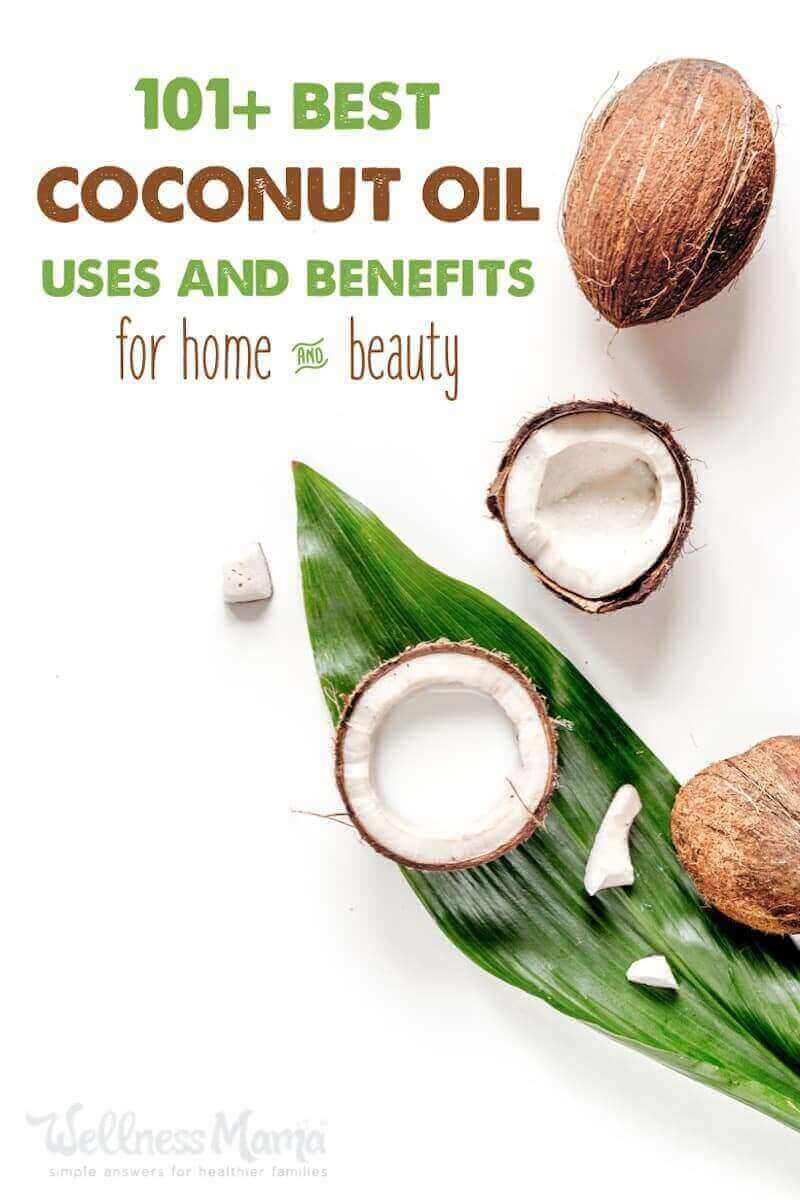

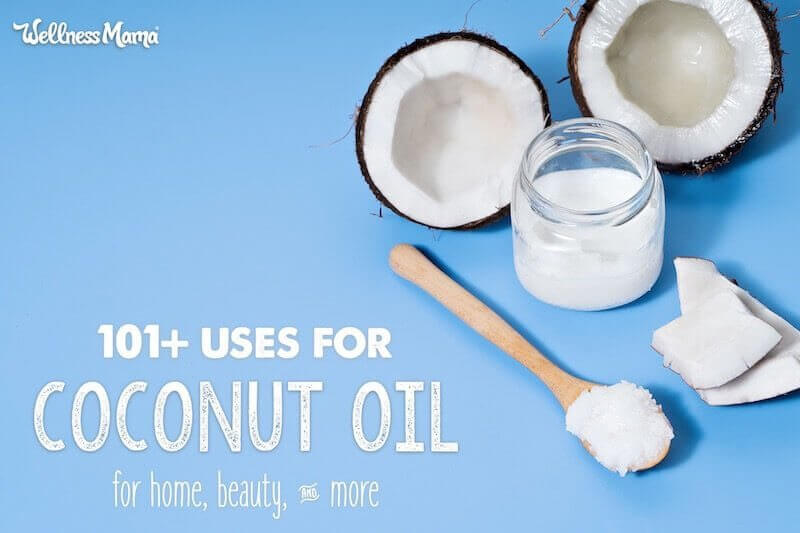
Leave a Reply